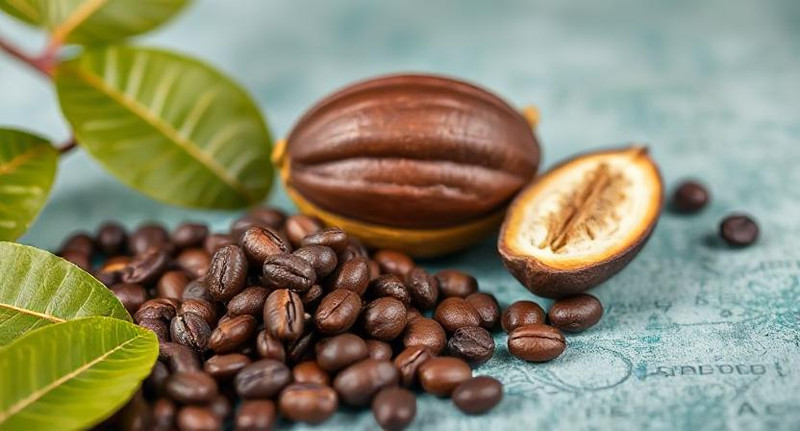You may have heard about antioxidants and their role in supporting health, but what are flavonoids? Flavonoids are a group of plant-based compounds that contribute to the color, taste, and health benefits of various foods. These natural compounds have antioxidant properties, protecting cells from damage and supporting well-being.
Many foods that have flavonoids are already part of a healthy diet, including fruits, vegetables, tea, and chocolate. Among these, flavonoids in cocoa powder have gained attention for their potential cardiovascular and cognitive benefits.
Flavonoids Meaning: What Are They?
The flavonoids meaning refers to a class of polyphenolic compounds found in plants. They are responsible for the vibrant colors of many fruits and vegetables and protect plants from environmental stressors. When consumed, flavonoids provide similar protective benefits to the human body by acting as antioxidants and supporting various physiological functions.
Flavonoids belong to a larger group of plant-based compounds known as polyphenols. Scientists have found thousands of flavonoids. They are sorted into groups by their structure and how they affect your health.
Flavonoids Benefits: Why They Matter
The flavonoids benefits extend beyond their antioxidant properties. These compounds are widely studied for their role in:
1. Supporting Heart Health
Flavonoids are linked to better cardiovascular function by helping to regulate blood pressure, improve circulation, and reduce inflammation. They may also help maintain healthy cholesterol levels.
2. Fighting Oxidative Stress
Oxidative stress occurs when free radicals damage cells. Flavonoids help neutralize these harmful molecules, reducing the risk of cell damage and aging-related conditions.
3. Boosting Brain Function
Some studies suggest that flavonoids support cognitive function by promoting better blood flow to the brain. Certain types of flavonoids, especially those found in cocoa, may contribute to memory and learning.
4. Reducing Inflammation
Chronic inflammation is linked to various health concerns, including joint pain and metabolic disorders. Flavonoids have natural anti-inflammatory properties that may help reduce inflammation in the body.
5. Supporting Immune Function
Some flavonoids help strengthen the immune system by improving the body's ability to fight infections and reducing inflammation.
Foods That Have Flavonoids: Best Dietary Sources
If you're looking to increase your intake of flavonoids, the best approach is to eat a variety of colorful plant-based foods. Some of the top foods that have flavonoids include:
1. Cocoa and Dark Chocolate
One of the richest sources of flavonoids is flavonoids in cocoa powder and dark chocolate. The cacao plant is naturally high in these beneficial compounds, particularly flavanols, a subgroup known for their cardiovascular benefits. For chocolate high in flavonoids, opt for darker, less processed varieties.
2. Berries
Blueberries, strawberries, raspberries, and blackberries are packed with flavonoids. These fruits are known for their antioxidant and anti-inflammatory properties, making them an excellent addition to any diet.
3. Citrus Fruits
Oranges, lemons, limes, and grapefruits contain flavanones, a type of flavonoid known to support heart health and circulation.
4. Green and Black Tea
Tea is one of the most widely consumed sources of flavonoids. Green tea, in particular, contains catechins, a type of flavonoid with strong antioxidant effects. Black tea also provides beneficial flavonoids, though in slightly different forms due to fermentation.
5. Apples
Apples contain quercetin, a flavonoid with potential anti-inflammatory and immune-supporting properties. Eating apples with the skin maximizes flavonoid intake.
6. Red Wine and Grapes
Red grapes and red wine contain flavonoids like resveratrol; these may help your heart. However, wine should be consumed in moderation.
7. Leafy Greens and Vegetables
Kale, spinach, onions, and broccoli contain various flavonoids that contribute to immune function and overall health.
Flavonoids in Cocoa Powder: A Powerful Source of Antioxidants
Among the different food sources, flavonoids in cocoa powder stand out due to their high concentration and health benefits. Cocoa flavanol have been studied extensively for their effects on heart health, cognitive function, and blood circulation.
When choosing cocoa products, look for those with a high percentage of cacao and minimal processing to retain the maximum flavonoid content. Natural or minimally processed cocoa powder and dark chocolate with at least 70% cacao are ideal choices.
How to Incorporate More Flavonoids into Your Diet?
Adding flavonoid-rich foods to your meals is simple. Here are a few easy ways to do so:
-
Snack on dark chocolate – Choose dark chocolate with a high cacao content for a flavonoid boost.
-
Drink tea regularly – Replace sugary drinks with green or black tea to increase your daily intake.
-
Add berries to breakfast – Sprinkle blueberries or raspberries over yogurt, oatmeal, or smoothies.
-
Eat more citrus fruits – Enjoy oranges, grapefruits, or a squeeze of lemon in water.
-
Use cocoa powder in recipes – Add unsweetened cocoa powder to smoothies, oatmeal, or homemade energy bars.
Final Thoughts
Understanding what are flavonoids and their role in health can help you make smarter food choices. These plant-based compounds offer numerous benefits, from supporting heart health to reducing inflammation and improving brain function.
By consuming foods that have flavonoids, including flavonoids in cocoa powder, tea, berries, and leafy greens, you can naturally support your well-being. Making small changes to include more flavonoid-rich foods in your daily routine can be an easy and effective way to enjoy their protective benefits.

